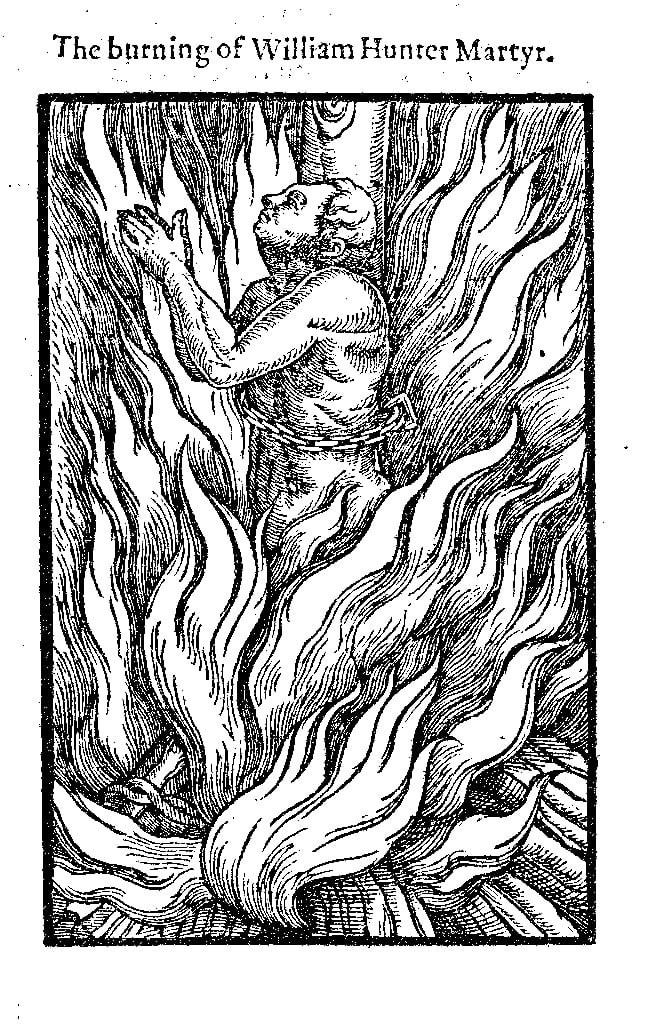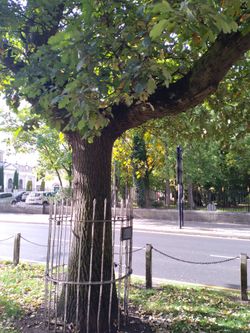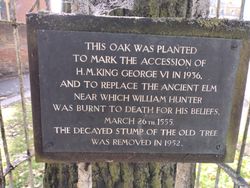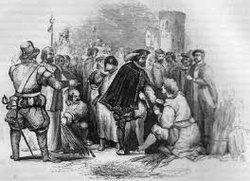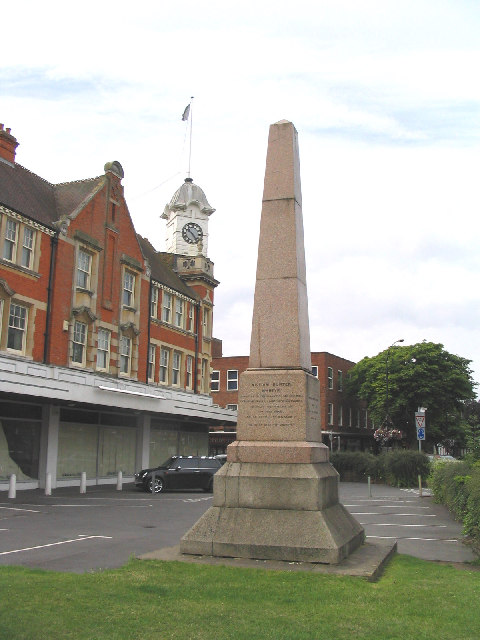“My lord, if you cannot persuade my conscience by scripture, I cannot find it in my heart to turn from God for the love of the world; for I count all worldly things but loss, in comparison with the love of Christ.”
Thus young William Hunter sealed his fate. In less than a month his teenaged body was burned at the stake by order of Bishop Bonner, AKA “Bloody Bonner”, the one who his detractors say “hounded men and women to death with merciless vindictiveness.” (Wikipedia) In the city of Brentwood there stands a memorial marker at the corner of Shenfield and Ingrave Road (A1023, Brentwood CM15 8AP) paying homage to the “Boy Martyr of Brentwood.”
“WILLIAM HUNTER. MARTYR. Committed to the Flames March 26th MDLV. Christian Reader, learn from his example to value the privilege of an open Bible. And be careful to maintain it.”
William was reared in the doctrines of the Reformation, and due to his love for the Word of God (did his father possess a smuggled copy of Tyndale’s New Testament?), he came to saving faith in Jesus at a very young age. When he turned sixteen, William left the safety and security of his home and moved to London to become an apprentice as a silk weaver. He worked diligently at his profession until the death of King Edward VI, the first king of England to be raised as a Protestant. Edward’s death in 1553 bought to the throne Mary, Edward’s half-sister and ardent Catholic. No sooner had Mary ascended the throne than she ordered everyone in London to attend the weekly Mass. When William refused to do so, his employer vigorously attempted to persuade him otherwise, but after a number of failings, William’s apprenticeship was terminated and he moved back to Brentwood.
William’s love for the Word of God was rekindled when he arrived home; if his father did not have a copy of Tyndale’s banned translation, the only place for him to satisfy his longing was at the local chapel. John Foxe (who wrote Foxe’s Book of Martyrs) picks up the story from there:
“After this it happened within five or six weeks, that William going into the chapel of Brentwood, and finding there a Bible lying on a desk, did read therein. In the mean time there came in one Father Atwell, a sumner, who hearing William read in the Bible, said to him, ‘What! meddlest thou with the Bible? Knowest thou what thou readest, and canst thou expound the Scriptures?’”
“To whom William answered and said, ‘Father Atwell, I take not upon me to expound the Scriptures, except I were dispensed withal; but I, finding the Bible here when I came, read in it to my comfort.’ To whom Father Atwell said, ‘It was never merry world, since the Bible came abroad in English.’”
“To the which words William answered, saying, ‘Father Atwell, say not so, for God’s sake: for it is God’s book, out of the which every one that hath grace may learn to know both what things please God, and also what displeaseth him.’ Then said Father Atwell, ‘Could we not tell before this time as well as now, how God was served?’ William answered, ‘No, Father Atwell, nothing so well as we may now; if that we might have his blessed word amongst us still as we have had.’ ‘It is true,’ said Father Atwell, ‘if it be as you say.’”
“’Well,’ said William Hunter, ‘it liketh me very well, and I pray God that we may have the blessed Bible amongst us continually.’ To the which words Father Atwell said, ‘I perceive your mind well enough: you are one of them that mislike the queen’s laws; and therefore you came from London, I hear say. You learned these ways at London: but for all that,’ said Father Atwell, ‘you must turn another leaf; or else you, and a great sort more heretics, will broil for this gear, I warrant you.’”
Agitated by Hunter’s words and attitude, Father Atwell left the chapel in search of the Justice of the Peace Anthony Browne. Once found, Browne conscripted William’s father to find the young man, to which his father retorted, “What, sir, would you have me seek my son that he may be burned?” When William was finally discovered, he agreed to return to Brentwood in order to spare his family any repercussions from his actions. Immediately, though, William was shackled and transported back to London in order to face the wrath and inquisition of the Bishop of London.
The Bishop used every means at his disposal (including bribery) to convince the teenager to recant of his ludicrous position, but to no avail. Foxe writes that Bonner tried five more times over the next nine months to elicit a repudiation of his beliefs, but William held firm. Realizing that nothing would dissuade the young man, Hunter was sentenced to be burned at the stake as a heretic on February 9, 1555.
“As he went out to his death, he stopped and read aloud Psalm 51. Then, as he was tied to the stake and the flames were lit, William Hunter cried out, ‘I am not afraid of death’. He lifted his eyes to Heaven and said, ‘Lord, receive my spirit’. William Hunter lived for his faith, and William Hunter died for his faith on 26th March 1555. He was just 19 years old, and became known thereafter as ‘the boy martyr of Brentwood.’” (Wilson, “The Boy Martyr of Brentwood”)
A couple of years after his death, Anthony Browne (the same Justice of the Peace to first examine Hunter) received a grant to found a school in Brentwood (The Grammar School of Antony Browne, Serjeant at the Law, in Brentwood). Located near the property used to carry out Hunter’s sentence, legend says that an elm tree grew on the very spot of the execution; the majestic elm, a mere shadow of its former glory, was later replaced by an oak tree with a plaque that read:
“This Oak was planted to mark the accession of H.M. King George VI in 1936, and to replace the Ancient Elm near which William Hunter was burnt to death for his beliefs, March 26th, 1555. The decayed stump of the Old Tree was removed in 1952.”
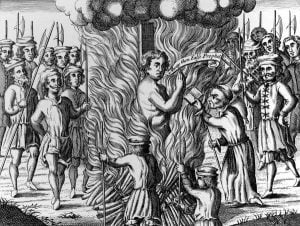
William Hunter Martyrdom (Image Credit: “Images From the John Foxe”S Acts and Monuments (the ‘Book of Martyrs’), Ninth Edition (1684).” Hyrax, dl.atla.com/concern/works/0z709294w?locale=en.)
Featured Image Credit: John Foxe (publisher), Public domain, via Wikimedia Commons
Related
Sorry, no records were found. Please adjust your search criteria and try again.
Sorry, unable to load the Maps API.
